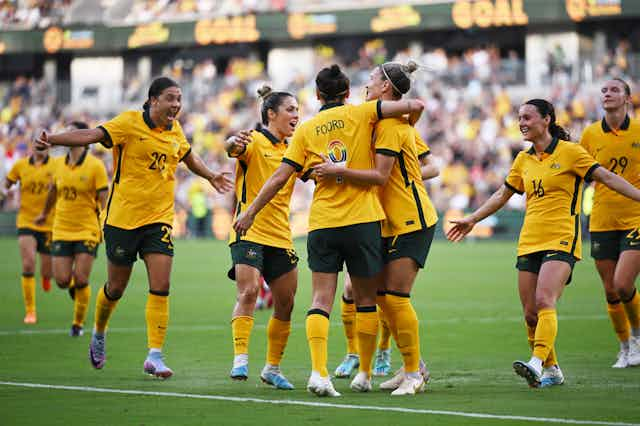The 2023 FIFA Women’s World Cup kicks off this Thursday night, the first football world cup hosted by Australia and Aotearoa New Zealand.
New Zealand opens the tournament by taking on Norway in Auckland, while Australia’s Matildas will play Ireland in front of an anticipated 80,000 fans at a sold out Stadium Australia in Sydney.
Despite the persistent delusion of some that politics should be kept out of sport, it has always been suffused with political calculations and meanings. The major question is not whether but what kinds of politics will be played and by whom.
In the lead up to this tournament, world football’s governing body FIFA announced a suite of eight armbands that could be chosen under its Football Unites the World program. Permitted selections, in partnership with various United Nations agencies, include “Unite for Indigenous Peoples” and “Unite for Gender Equality”.
But notably, the OneLove armband associated with LGBTIQA+ rights isn’t among them. That was banned at last year’s Men’s World Cup in Qatar, with captains including England’s Harry Kane threatened with a yellow card if they wore it as planned.
Unlike in Qatar, homosexuality is not illegal in these host countries, but FIFA’s “extensive consultation with stakeholders including players and the 32 participating member associations” produced the same outcome.
Read more: Why is the Qatar FIFA World Cup so controversial?
Among the latter are three African countries (Morocco, Nigeria and Zambia) where homosexuality is criminalised, as it is in stakeholders including Middle Eastern nations such as Saudi Arabia that are increasingly influential in football and other world sports.
Australia’s captain Sam Kerr has been deprived, to her regret, of the opportunity to make a statement with a rainbow-coloured armband.
But 44 players have taken the chance to cooperate with climate advocacy groups Common Goal and Football For Future to help compensate for the environmental impact of their world cup related flights.
Already it’s clear that politics will vie with passes and penalties as major talking points at the biggest sport event in the region since the 2000 Sydney Olympics.
Indeed, when the esteemed Brazilian team flew into Brisbane two weeks before the first ball would be kicked, their plane’s tail bore pictures of Iranian human rights activists Mahsa Amini and Amir Nasr Azadani. The plane’s body also declared, “No woman should be forced to cover her head” and “no man should be hanged for saying this”.
FIFA scandals and sports diplomacy
FIFA has an ignoble history of corruption, exploitation and ethical malpractice – despite its professed commitment to human rights and transparency.
The BBC podcast Powerplay: The House of Sepp Blatter excruciatingly details the disgrace of the former FIFA President. Just before Blatter was re-elected in Zurich in 2015, the world’s media were treated to the spectacle of FIFA executives being arrested and taken from their hotel under large bedsheets (Blatter then resigned just days after being re-elected).
His successor Gianni Infantino, the object of much mockery after a pre-Qatar World Cup speech identifying with the oppressed, promised to clean up FIFA’s act and reinvent itself as a force for global good. Promoting gender equality in and through football is one such aim. This world cup, both the first hosted by two confederations (Asia and Oceania) and the first in the southern hemisphere for women, seems perfectly to fit that bill.
Read more: FIFA's mirage of unity: why the World Cup is a vessel for political protest
It undoubtedly has significant geopolitical implications. With the Pacific region the focus of a contest for influence between the US and its allies and China, sport has emerged as a key bargaining chip. Money for sport aid, development and infrastructure has been flowing into the Pacific islands from all directions.
Australia’s Sports Diplomacy 2030 initiative has been especially keen on Pacific partnerships, not least in football as part of its “Global Strategy with a Pacific Focus”. The Oceania Football Confederation’s and Football Australia’s Legacy Plans frequently invoke the rhetoric of the Pacific family. At the world cup, women will be unusually prominent in the sphere of sports diplomacy.
Political games
The concept of sportswashing entered the popular lexicon quite recently to describe the use of sport, especially by illiberal states including China and Russia, to disguise their abuses of human rights and ingratiate themselves with sports fans around the world.
While this is unquestionably the case, sport’s emotional power is harnessed by all countries, liberal democratic and otherwise, to project a more positive image than is generally warranted. This “feel good” global publicity, though, brings intense scrutiny far beyond the football field.
The two settler colonial countries hosting the 2023 Women’s World Cup still have much to redress regarding their First Nations peoples, who have called FIFA and their respective associations and confederations to account. The event’s “bespoke” Sustainability Strategy and its “key social, economic, human rights and environmental priorities for the current time and geographical context” will be thoroughly examined.
This world cup is a landmark event that will bring pleasure to many people. An important moment in the recognition and development of women’s football, Infantino has positioned it as a staging post on the path towards gender pay parity by 2027. In this respect, the amount commanded in crucial media (especially broadcast) rights has been less than encouraging.
But one thing is certain – this will not be a politics-free festival of football.

